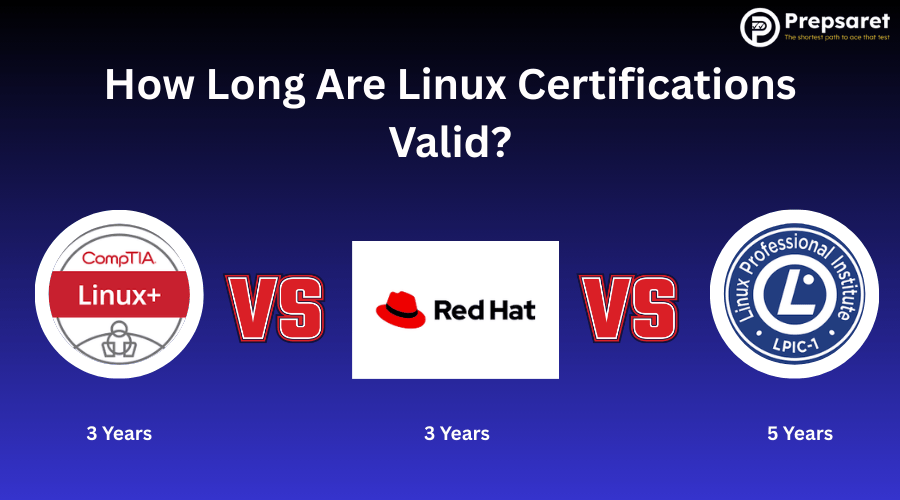If you’re chasing a career in IT, you’ve probably heard how valuable Linux certifications can be. They open doors to system administration roles, boost your credibility with employers, and prove you’ve got the skills to thrive in a Linux-driven world.
But here’s the catch: not all certifications last forever. Some come with a clear expiration date, while others are stamped as lifetime credentials.
So, the big question becomes: how long do Linux certifications expire, and what does that mean for your career? It’s also a common topic in communities like “do Linux certifications expire Reddit”, where professionals share renewal strategies.
Staying on top of your Linux certification validity timelines helps you stay competitive, confident, and ready for the next opportunity.
And if renewal time is creeping up on you, tools like Prepsaret Test Prep resources can make exam prep feel less like a chore and more like a smooth ride.
Why Certification Validity Matters in IT Careers
Certifications aren’t just shiny badges on your résumé—they’re proof that you’ve got the skills to thrive in today’s fast-moving tech world.
When it comes to Linux Administrator certification paths and open-source systems, staying current is critical. Here’s why expiration of Linux certifications makes such a difference:
- Keeps your skills up-to-date: Expiring certifications push professionals to refresh their knowledge as technology evolves.
- Boosts employer confidence: Managers value Linux certs that prove you can handle today’s tools, not outdated ones.
- Protects career opportunities: Letting a cert expire can mean losing credibility with peers, missing out on promotions, or being overlooked by recruiters.
- Ensures long-term growth: Staying current helps you remain competitive and ready for the next step in your IT career.
Find out: What Jobs Can You Get with CompTIA Linux+ Certification?
How Long Are Linux Certifications Valid?
The truth is, there’s no single answer. Different vendors have different Linux certification duration policies, and they design them to reflect how quickly technology changes.
Many professionals often ask, “How long are Linux certifications valid?” The answer: it depends on the issuing authority.
Typical Certification Duration Across Vendors
Not all Linux certifications follow the same timeline. Different vendors set different validity periods, and knowing these cycles can save you from unpleasant surprises when Linux certification renewal comes around. Here’s how it usually breaks down:
- CompTIA Linux+: Valid for three years, after which you’ll need renewal through exams or continuing education. Many ask, “Do CompTIA Linux+ certifications expire?” The answer is yes.
- Red Hat Certifications (RHCSA, RHCE, etc.): Also valid for three years. This forms part of Red Hat certification validity, and yes, if you’ve wondered, “Does Red Hat Linux certification expire?”—it does.
- LPIC certifications: Valid for five years. If you’ve asked, “How long does LPIC certification last?”—it’s five years before LPIC certification renewal is required.
- Lifetime Linux certifications: Some older programs were issued as permanent, though today they’re rare. These are often discussed under “IT certifications that require renewal vs. lifetime Linux certs.”
This variety reflects the fast pace of Linux and open-source innovation. Renewal requirements ensure professionals keep their knowledge sharp and aligned with current technologies.
Learn more: How long does it take to study for CompTIA Linux+?
CompTIA Linux+ Expiration and Renewal Explained
The CompTIA Linux+ expiration cycle is one of the clearest: it’s valid for three years. After that, you’ll need to renew to keep it active.
Renewal is handled through the CompTIA Continuing Education (CE) program.
You don’t always need to retake the exam—you can also earn CEUs (Continuing Education Units) through approved training, attend industry events, or move up the ladder by earning a higher-level certification.
Still, retaking the Linux+ is always an option if you want a direct refresh.
Understanding the XK0-005 Exam Cycle
CompTIA also updates its exams every few years. The current version is XK0-005, which replaced the older XK0-004. Many professionals track the CompTIA Linux+ XK0-005 expiration date, and the rule is consistent: it lasts for three years.
When a new version launches, the old one eventually retires, but don’t panic—if you passed XK0-004, your certification is still valid for its full three-year cycle.
The key is to stay aware of updates. That way, your Linux certification validity plan includes the most recent exam version, keeping you aligned with the certification roadmap.
Related post: CompTIA Linux+ Exam Objectives
Red Hat Certification Validity and Renewal Policy
Red Hat certification validity is three years for RHCSA, RHCE, and other Red Hat credentials. Given Red Hat’s dominance in enterprise environments, keeping these credentials current is essential if you’re aiming for system admin, DevOps, or enterprise IT roles.
Many IT pros ask, “Does Red Hat Linux certification expire?” Yes, it does. Renewal works much the same way as with CompTIA: you can either retake the same exam or push yourself further by earning a higher-level Red Hat credential.
Employers recognize this commitment as a sign of continuous growth and respect for IT certifications that expire.
Linux Foundation Certifications: CKA, CKAD, and Renewal Rules
The Linux Foundation certification policy is clear: most credentials, including the Certified Kubernetes Administrator (CKA) and Certified Kubernetes Application Developer (CKAD), are valid for three years.
- CKA certification validity check: You can confirm your expiration date by logging into your Linux Foundation account.
- CKAD certification validity: Like CKA, it’s three years before you need renewal.
So, “Do I need to renew my Linux Foundation certification?” Yes. The Linux Foundation doesn’t offer simple extensions—you’ll need to retake the exam. While this might feel tough, it ensures your container and cloud-native skills stay current.
LPIC Certification Duration and Renewal Process
Now, let’s talk about LPIC certifications from the Linux Professional Institute (LPI). These are valid for five years, which is longer than most.
When it comes time to renew, you’ve got options:
- Retake the same exam to prove your skills are still on point.
- Earn a higher-level LPIC certification, which resets the validity for lower-level certifications too.
So, “How long does LPIC certification last?” The answer is five years. LPIC certification renewal ensures your credentials remain competitive and globally respected.
Best CompTIA Linux+ Prep Resources
Getting ready for the CompTIA Linux+ exam (whether for your first attempt or Linux certification renewal) can feel like a big challenge—but the good news is, the right prep resources can make all the difference.
Since the exam is known for testing practical, real-world Linux skills, your study plan should be just as hands-on and well-rounded.
Here are some of the best resources to help you succeed:
- Prepsaret Linux+ Prep Course – Highly recommended for anyone serious about passing. It combines structured study guides, practice questions, and real-world labs, making it a complete package for exam success.
- Official CompTIA Study Guides – A solid foundation straight from the source, covering all exam objectives in detail.
- Online Labs – Safe, virtual environments where you can practice Linux commands and troubleshoot like you would on the job.
- Instructor-Led Training – Great if you prefer guided learning with opportunities to ask questions in real time.
No matter which mix of tools you choose, the key is quality and relevance. Always make sure your materials match the latest version of the Linux+ exam. Outdated resources are like old maps—they might get you part of the way, but they’ll leave you lost when it matters most.
Try this out: CompTIA Linux+ Free Questions
Which Linux Certifications Never Expire? Lifetime vs Renewable Credentials
Back in the day, some certifications came with lifetime Linux certifications. Once you earned them, they were yours forever. Sounds nice, right?
The problem is, technology doesn’t stand still. A certification from 2005 doesn’t prove you know today’s Linux systems. That’s why most organizations have moved to renewable models.
If you’ve ever asked, “Which Linux certifications never expire?”—the answer is very few. Today, most fall under the category of IT certifications that expire, requiring proactive maintenance. This protects the credibility of the certification.
Do I Need to Renew My Linux Certification? Best Practices for IT Professionals
Here’s the big question: “Do I need to renew my Linux Foundation certification?” or “Do CompTIA Linux+ certifications expire?” The answer is yes across most modern programs.
So, “How long are Linux certifications valid?” The standard is three to five years depending on the issuing organization. Whether you’re tracking CompTIA Linux+ expiration, Red Hat certification validity, or LPIC certification renewal, it’s important to plan ahead.
Renewing your Linux certification is about more than keeping a line on your résumé. It’s a sign of continuous learning and professional growth.
Continuing Education and Maintaining Certification Value
Another way to keep your certification—and your skills—fresh is through continuing education for Linux certifications. Many programs let you earn CEUs (Continuing Education Units) through training courses, webinars, or by completing higher-level certifications.
This option helps distinguish between IT certifications that require renewal vs. lifetime Linux certs. The benefit? You’re not just ticking boxes—you’re building knowledge that makes you more competitive.
Continue reading: Best Linux Distributions to Learn for CompTIA Linux+
Do Linux Certifications Expire?: FAQs
Which Linux Certs Don’t Expire?
Some entry-level Linux certifications, such as Linux Essentials and certain LinuC certifications, do not expire and have lifetime validity.
They represent foundational knowledge and do not require renewal, unlike more advanced certifications that have defined expiration periods to keep skills updated.
Does Linux+ Need to be Renewed?
Yes, the CompTIA Linux+ certification must be renewed every three years. Renewal ensures that holders maintain up-to-date knowledge and skills. Typically, renewal can involve earning continuing education units or retaking the exam before the certification expires.
How Long is the Linux Essentials Certification Good For?
The Linux Essentials certification holds lifetime validity, meaning it does not expire. This certification is designed as an entry-level credential to demonstrate foundational understanding of Linux, and it remains valid indefinitely without requiring renewal.
How Much Does the Linux Cert Cost?
Linux certification costs vary depending on the provider and certification level. For example, entry-level exams like Linux Essentials typically cost around $120.
More advanced certifications can be priced higher, ranging from a few hundred to several hundred dollars depending on the issuing organization.
Does RHCE Expire?
The Red Hat Certified Engineer (RHCE) certification is current for three years. It does not technically expire but becomes "non-current" after this period.
To maintain current status, certified professionals must recertify by passing the latest exam version before the end of the three-year period.
Final Thoughts: Do Linux Certifications Expire?
So, do Linux certifications expire? Yes, most of them do. Some last three years, others five, and while lifetime Linux certifications still exist here and there, they’re rare.
The shift to renewable certifications isn’t a burden—it’s a career advantage. Think of it as a built-in way to keep your skills sharp, your résumé strong, and your opportunities wide open.
Whether you’re aiming for Linux Foundation certification renewal, tracking your CompTIA Linux+ XK0-005 expiration date, or comparing IT certifications that expire with those rare lifetime Linux certifications, one thing is clear: renewal isn’t just about keeping a certificate alive—it’s about keeping your career alive, too.




